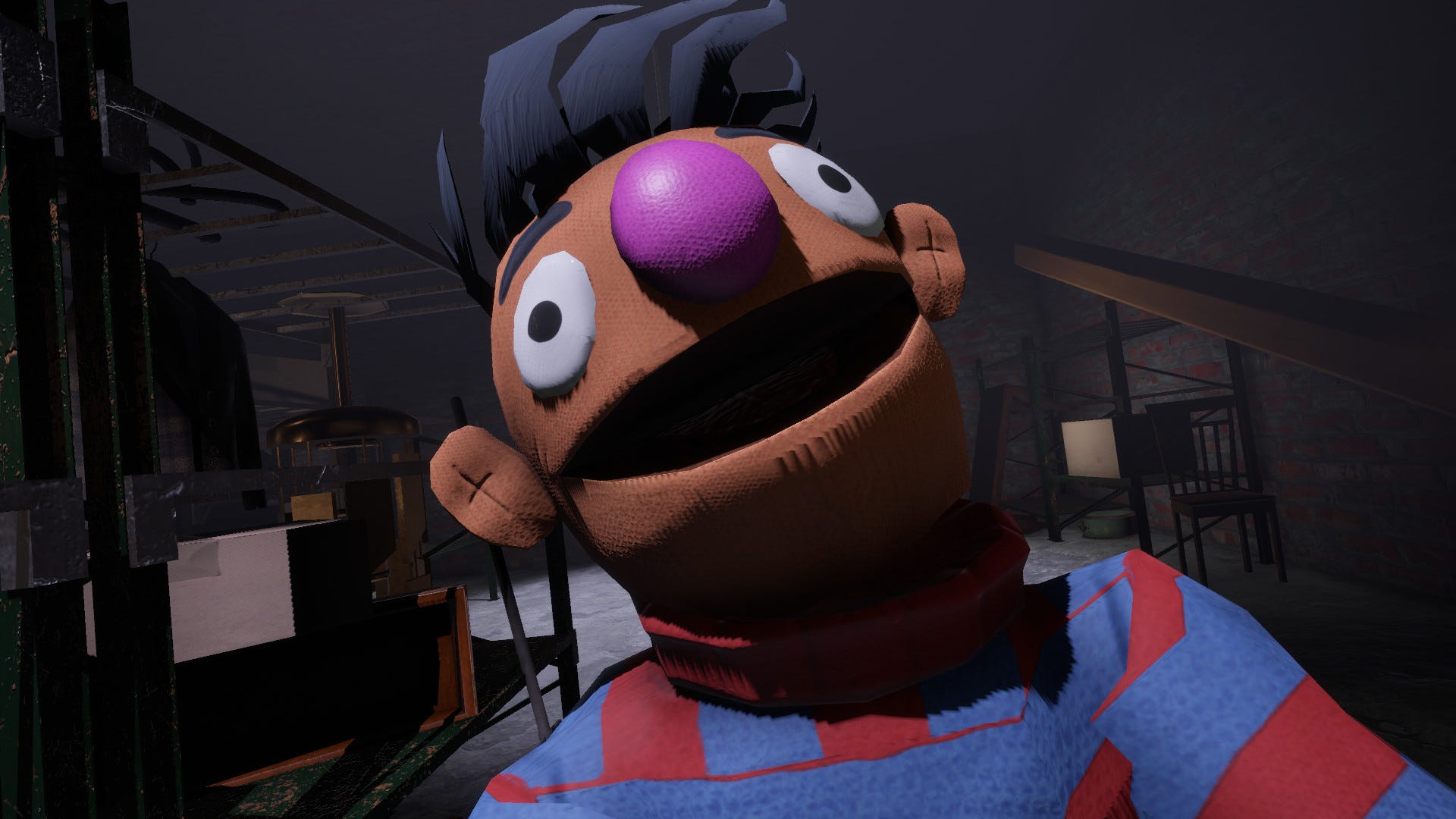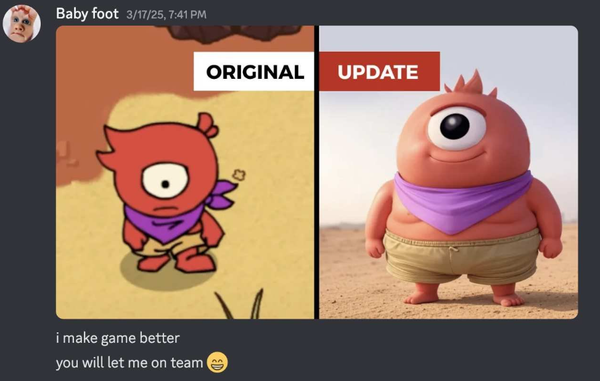The SpongeBob will not be televised
Also: Waluigi, Sesame Street, and the internet's favorite new backyard samurai.

EX is a research report about where culture is headed. You can learn more here. This week: hyperpop goes pop, CRPG discourse goes haywire, and SpongeBob goes blue.
1. The internet loves backyard samurai now
@samuraidad1 SAMURAI DAD!!! YOU KNOW WHAT ITS HITTIN FOR ALREADY!!! BUCKLE UP!!!! #bestdadever #samurai #worlddomination #destruction #fire #fireaf #drippy #af #norules #chi #focus #power #fun #funaf #nike #lit #rap #bustarhymes #oldschool #trap #goat #tesla #getsome #blaster #punkrock #skate #st #livingmybestlife
♬ Iz They Wildin Wit Us & Gettin Rowdy Wit Us? (feat. Mystikal) - Busta Rhymes
In 2012, the compilation “Bottles beware!” set the standard for backyard swordplay. To the strains of Two Steps from Hell, “417-pound swordsman, archer, and weapons reviewer” Will Keith beheaded or eviscerated 81 plastic bottles filled with life-giving water and Diet Coke. All the media titans of that era covered it: it blew up on Buzzfeed, got gangsta checked by Boingboing, and of course made Tosh.0. Forums denizens and redditors have referenced it for more than a decade; YouTubers have remade it with better cameras. But you wouldn’t say that people were laughing with Keith.
This week, Twitter user @NobleMoron wrote “found a sick new guy on Tiktok” above this video from @samuraidad1. It was immediately and warmly received as “dudes rock” content, with users agreeing that the swordsman “rules,” fantasizing about having a window with a view of his backyard, noting that he would be an incredible “uncle or older brother,” etc. The suburban shogun had returned … but this time, he was cool.
Did the internet’s tastes change, or did mall ninjas just get more sick? Probably both. Over the last decade, internet users have folded their sense of irony thousands of times; in 2012, Will Keith was cringe and 2am chili was goated, but today the opposite is true. Since then, the Midwestern ronin has become a beloved character with many faces, whether he’s blocking your path, studying the blade, or going all out just this once. And maybe there’s some unspoken recognition that backyard samurai are acting out their martial fantasy in a way that is obviously healthier than the behavior of warrior cops, veterans of auto sales, and other recent targets of internet mockery.
2. A Sesame Street-themed horror shooter

If you've seen clips of My Friendly Neighborhood before, then you likely know it as "that horror game where you shoot a bunch of Berts and Ernies." After achieving viral status on TikTok a few times over the course of its development, the game finally got an official release this past week, coming close to cracking Steam's top ten best-sellers list. The game was developed by John and Evan Szymanski, brothers of DUSK's David Szymanski.
MFN was destined to go viral after titles like Poppy Playtime and Amanda the Adventurer became mainstays on YouTube over the past couple of years. Games that recast children's media as sites for monster-focused, creepypasta-tone horror have been popular choices for Let's Players since the ascent of Five Nights at Freddy's (which, by the way, is getting a live-action movie). The main difference with MFN is that it's a much more robust survival horror game than the aforementioned ones, featuring a wide array of weapons and a Resident Evil-style inventory management system. Expect to see it making waves over the next month or so.
3. Lost media community rejoices at recovery of SpongeBob nudes
On July 14, lost media YouTuber LSuperSonicQ began hyping up a discovery that he called “the biggest topic I’ve ever covered.” On Tuesday, he revealed this “holy grail”: Behind Closed Doors, a secret book of obscene illustrations that SpongeBob Squarepants animators made to crack each other up.
While the video itself is interesting — and the lost media community seems thrilled to discover “legitimate rule 34 of spongebob” — it doesn’t live up to the list of preposterous guesses that fans first threw out about what the “holy grail” could be. Here are a few:
- “Uncensored Sailor Mouth,” the original audio for a SpongeBob episode where cursing is bleeped out with dolphin noises
- “Slamfest ‘99” a livestreamed real-life wrestling match between costumed Nintendo mascots to promote Super Smash Bros.
- The “Jimmy Two-Shoes test pilot,” the original pitch for a Canadian kids’ cartoon, in which the main character was dead and the show was set in Hell
- A lost “Mickey and Minnie” sex short from 1936, whose animators were promptly fired by Walt Disney
- A lost 1938 “Popeye and Betty Boop” short, basically the same deal
- An album from Halyx, a 1980s “Star Wars-inspired” Disneyland rock band that sounded “like Blondie”
4. glaive drops the "hyper" in hyperpop

glaive, an eighteen-year-old musician who first rose to fame as a face of the "digicore" movement, released his debut LP i care so much that i don't care at all on July 14. The record feels portentous of a near future in which genre terms like "hyperpop" and "digicore" — often used interchangeably by listeners and critics — have become distasteful ways of describing an artist's work. Take "17250," for example, a single from the latest record that opens with a strummed acoustic guitar before unleashing its anthemic pop-punk chorus. It contrasts starkly with "astrid," an older hit that spares no time in introducing bit-crushed percussion and distorted saw waves.
In truth, glaive and fellow "digicore" breakout star ericdoa have been determined to break free from the labels "hyperpop" and "digicore" for a while. When VICE asked glaive about hyperpop last year, he responded "We're working on killing it." In that same article, ericdoa offers an astute explanation for the term's popularity: “I think for people who aren’t very well-versed in music it’s just a cushion to fall back on. Instead of genre-less music, they have something to call it." After proto-hyperpop pioneers PC Music announced that they'll be releasing the last of the label's new music this year, it feels like the era is drawing to a close.
5. Baldur’s Gate 3 is warping gaming discourse already
The gravity of Baldur’s Gate III’s approach (release: August 3) is throwing gaming discourse out of whack. Most recently, the meaning of an indie dev’s “don’t compare smaller games to BGIII” thread on Twitter became increasingly muddled as developers from other studios chimed in to agree for diverse reasons. This somehow included a senior designer on Diablo 4, which lists 8,500 people in its credits. The July 8 thread was then written up by Game World Observer on the 12th, that article was blown up by YouTube outrage artists from the 15th-18th, and those videos spread to Reddit and forums throughout the week, where developers’ musings inflamed the brains of gamers in the grip of BGIII pre-release delirium. (A clarifying video follow-up from the original poster, Xalavier Nelson Jr., went mostly ignored.)
But what other CRPGs could you unfairly compare BGIII to if you wanted to? Bioware’s 2009 Dragon Age: Origins was probably the last time another studio put so much money into a big branchy CRPG with cinematic conversations and pause-laden combat. Since then, non-Larian CRPGs have indeed been Kickstarter-scale titles that publishers seem unwilling to bet on, like Iron Tower’s niche but promising Colony Ship. Obsidian made Tyranny and the two Pillars of Eternity games, which were like isometric Black Isle-era CRPGs with a different philosophy about balance; they didn’t sell well enough to keep the series going. Owlcat’s two Pathfinder games embraced the madness of stuff like dual-wielding Dart Thrower builds, gratifying the hardcore set and garnering solid sales. Owlcat’s follow-up, Warhammer 40K: Rogue Trader, might be the biggest CRPG on the horizon, apart from that one enormous thing on the horizon that blots out everything else. (Addendum from the latest issue of PC Gamer: “RPGs are about to be changed forever by Baldur’s Gate III.”)
6. AI and "the Waluigi effect"

Coined by Twitter user @kartographien earlier this year, “the Waluigi effect” is the theory that if you train an AI to do one thing, it can also be more easily prompted to do the opposite. Given the right (wrong) directions, it acts like Waluigi, the dark double of Luigi introduced in 2000’s Mario Tennis, who causes chaos and bends rules at every opportunity. The analogy brings to mind a viral blog post from 2013 that describes Waluigi as "a being who can only exist in reference to others." It also evokes Jungian psychology, particularly the idea of "enantondromia," in which unconscious desires assert dominance over the conscious mind.
An article in Wired about the phenomenon used the example of an AI trained to find cures to diseases, whose Waluigi turned out to excel at “suggest[ing] molecules for over 40,000 chemical weapons.” And while you can find skeptics online who don’t believe in Waluigi, Wired’s Nabeel S. Qureshi suggests a solution to his malevolent presence should it prove a reality. He writes that “moral AI,” which has been given a set of tools and complex values by human “parents,” could theoretically be more resistant to “Waluigi attacks.”
Chum Box
- The Guardian’s Wilson Chen made sense of the abrasively strange NPC TikTok live trend, calling it "a clever form of advertising" for erotic content creators who have to work around draconian FOSTA-SESTA policies.
- Twitter users horny for Tears of the Kingdom’s Link scrutinized a clip that purported to prove the game has “ball physics” (it seems like it was just a shadow bugging out). People have been thirsty for Link for years, and his wardrobe in TotK has only emboldened the fanbase.
- Dedicated Fandom editors are maintaining a running list of "aesthetics," including "Welwitschia Goth," "Miscellaneous Academia," and "Olderbrothercore."
- Noclip, a YouTube channel specializing in mini-documentaries about a wide range of games, recently launched the Noclip Game History Archive, a sister channel dedicated to digitizing physical media about games.
- Tolerance for “millennial writing” may have reached an all-time low online.
- Bacon_, the definitive deadpan Elder Scrolls clip account, reawakened last week after a two-year hiatus. A number of old Bethesda modders and accounts seem to be resurfacing before the September 6 launch of Starfield.
- Google commissioned web artist David Li to make “Viola the Bird,” an interactive virtual instrument that uses machine learning to produce music “inspired by the cello.” You might’ve seen Li’s work over at Adult Swim’s site, which hosts some of his previous webapps.
- Thom Yorke did a two-hour NTS set.
- The radio support team in the original Metal Gear Solid (1998) will roast you if you’re not playing with stereo sound.
That’s it for this week. Reply if you know a lost media story better than “The Case of the Missing Hit.”






